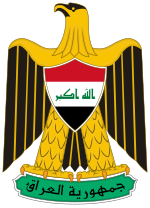
The economy of Iraq is dominated by the oil sector, which has provided about 99.7% of foreign exchange earnings during its modern history. As of 2021, the oil sector provides about 92% of foreign exchange earnings. Iraq's hitherto agrarian economy underwent rapid development following the 14 July Revolution (1958) which overthrew the Hashemite Iraqi monarchy. It had become the third-largest economy in the Middle East by 1980. This occurred in part because of the Iraqi government's successful industrialization and infrastructure development initiatives in the 1970s, which included irrigation projects, railway and highway construction, and rural electrification.

The Liberation Tower is a 372-meter-high or 1,220 feet tall telecommunications tower in Kuwait City, Kuwait. It is the second-tallest structure in the country and the 39th tallest building in the world. The tower is not publicly accessible to tourists. However, the complex building attached to the tower houses government offices such as the Communication and Information Technology Regulatory Authority and a government service center that offer civil services related to Ministry of Interior, Ministry of Foreign Affairs, Public Authority For Civil Information, Ministry of Justice, Public Institution for Social Security, Ministry of Commerce and Industry, Fire Service Directorate, and Ministry of Social Affairs and Labour.

The Peshmerga comprise the standing military of Kurdistan Region, an autonomous political entity within the Republic of Iraq. According to the Constitution of Iraq, the Peshmerga and their security subsidiaries are solely responsible for the security of Kurdistan Region, chiefly due to the fact that the Iraqi Armed Forces are forbidden to enter Iraqi Kurdistan. These subsidiaries include Asayish, Parastin û Zanyarî, and Zêrevanî. The Peshmerga's history dates back to the 18th century, when they began as a strictly tribal pseudo-military border guard under the Ottoman Turks and the Safavid Iranians. By the 19th century, they had evolved into a disciplined and well-trained guerrilla force.
The industry minister is a cabinet position in a government.
A Commerce minister is a position in many governments that is responsible for regulating external trade and promoting economic growth. In many countries, this role is separate from a finance minister, who has more budgetary responsibilities.
A ministry of petroleum or ministry of oil is a kind of government ministry often found in countries that are producers and exporters of petroleum.
The Iraqi Armed Forces are the military forces of the Republic of Iraq. They consist of the Iraqi Army, the Iraqi Air Force, and the Iraqi Navy. Along with these three primary service branches, there exists the Iraqi Counter Terrorism Service and the Popular Mobilization Forces. The President of Iraq acts as the supreme commander as outlined by the constitution.

The Ministry of Interior (MOI) is the government body charged with overseeing policing and border control in Iraq. The MOI comprises several agencies, including the Iraqi Police, Highway Patrol, Traffic Department, Emergency Response Unit, Explosive Ordnance Disposal Unit, and Department of Border Enforcement. Following passage of the Facilities Protection Service Reform Law, the Ministry absorbed FPS personnel previously spread among other ministries. The MOI has approximately 380,430 employees, and the Ministry of Finance approved US$3.8 billion for its 2008 budget, representing a 21% growth over the previous year.
The Mohafiz is a family of internal security vehicles designed and manufactured by Heavy Industries Taxila with Cavalier Group also designing later production models.
The Iraq National Oil Company (INOC) was founded in 1966 by the Iraqi government. It was empowered to operate all aspects of the oil industry in Iraq except for refining which was already being run by the Oil Refineries Administration (1952) and local distribution which was also already under government control.
The federal government of Iraq is defined under the current Constitution, approved in 2005, as an Islamic, democratic, federal parliamentary republic. The federal government is composed of the executive, legislative, and judicial branches, as well as numerous independent commissions.

The following outline is provided as an overview of and topical guide to Iraq:

The Ministry of Defence and Armed Forces Logistics is the defence ministry of the Islamic Republic of Iran and part of the country's executive branch. It thus reports to the President of Iran, not to the Commander-in-Chief of the Iranian Armed Forces.

Oil reserves in Iraq are considered the world's fifth-largest proven oil reserves, with 140 billion barrels.

Brazil–Iraq relations are the foreign relations between Brazil and Iraq. Brazil maintains an embassy in Baghdad and Iraq maintains an embassy in Brasília. Both countries are full members of the Group of 77.

A ministry of trade and industry, ministry of commerce, ministry of commerce and industry or variations is a ministry that is concerned with a nation's trade, industry and commerce.

Iraq was the world's 5th largest oil producer in 2009, and has the world's fifth largest proven petroleum reserves. Just a fraction of Iraq's known fields are in development, and Iraq may be one of the few places left where vast reserves, proven and unknown, have barely been exploited. Iraq's energy sector is heavily based upon oil, with approximately 94 percent of its energy needs met with petroleum. In addition, crude oil export revenues accounted for over two-thirds of GDP in 2009. Iraq's oil sector has suffered over the past several decades from sanctions and wars, and its oil infrastructure is in need of modernization and investment. As of June 30, 2010, the United States had allocated US$2.05 billion to the Iraqi oil and gas sector to begin this modernization, but ended its direct involvement as of the first quarter of 2008. According to reports by various U.S. government agencies, multilateral institutions and other international organizations, long-term Iraq reconstruction costs could reach $100 billion (US) or higher.

Al-Sinaat Al-Kahrabaiya Sport Club, is an Iraqi football team based in Baghdad, that plays in the second tier Iraqi Premier Division League.

Iraq–Spain relations are the bilateral and diplomatic relations between these two countries. Iraq has an embassy in Madrid. Spain has an embassy in Baghdad and an honorary consulate in Erbil.












